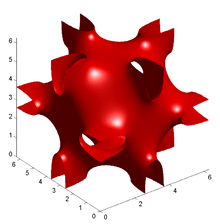Neovius surface

In differential geometry, the Neovius surface is a triply periodic minimal surface originally discovered by Finnish mathematician Edvard Rudolf Neovius (the uncle of Rolf Nevanlinna).[1][2]
The surface has genus 9, dividing space into two infinite non-equivalent labyrinths. Like many other triply periodic minimal surfaces it has been studied in relation to the microstructure of block copolymers, surfactant-water mixtures,[3] and crystallography of soft materials.[4]
It can be approximated with the level set surface[5]
In Schoen's categorisation it is called the C(P) surface, since it is the "complement" of the Schwarz P surface. It can be extended with further handles, converging towards the expanded regular octahedron (in Schoen's categorisation)[6][7]
References
- ↑ E. R. Neovius, "Bestimmung zweier spezieller periodischer Minimalflächen", Akad. Abhandlungen, Helsingfors, 1883. http://resolver.sub.uni-goettingen.de/purl?PPN591417707
- ↑ Eric A. Lord, and Alan L. Mackay, Periodic minimal surfaces of cubic symmetry, Current science, vol. 85, no. 3, 10 August 2003
- ↑ S. T. Hyde, Interfacial architecture in surfactant-water mixtures: Beyond spheres, cylinders and planes. Pure and Applied Chemistry, vol. 64, no. 11, pp. 1617–1622, 1992
- ↑ AL Mackay, Flexicrystallography: curved surfaces in chemical structures, Current Science, 69:2 25 July 1995
- ↑ Meinhard Wohlgemuth, Nataliya Yufa, James Hoffman, and Edwin L. Thomas. Triply Periodic Bicontinuous Cubic Microdomain Morphologies by Symmetries. Macromolecules, 2001, 34 (17), pp 6083–6089
- ↑ Alan H. Schoen, Triply Periodic Minimal Surfaces (TPMS), http://schoengeometry.com/e-tpms.html
- ↑ Ken Brakke, C-P Family of Triply Periodic Minimal Surfaces, http://www.susqu.edu/brakke/evolver/examples/periodic/cpfamily.html
